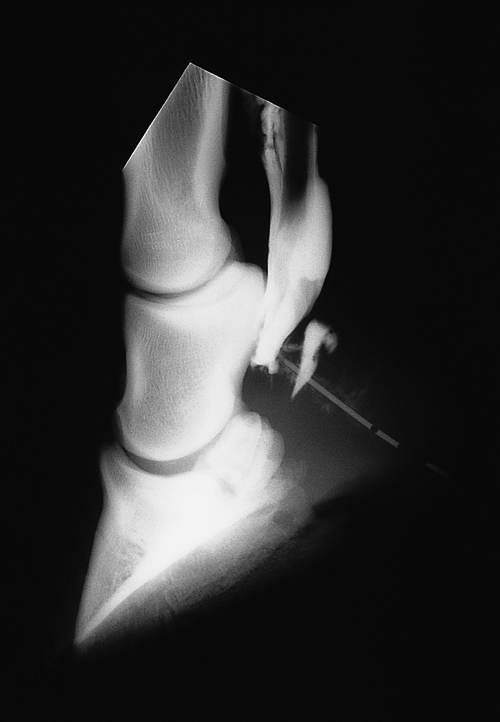Difference between revisions of "Equine Orthopaedics and Rheumatology Q&A 18"
Jump to navigation
Jump to search
Ggaitskell (talk | contribs) (Created page with "{{Template:Manson May}} centre|500px<br> <br /> '''A five-year old half-bred gelding presented with a severe lameness...") |
|||
| (3 intermediate revisions by 3 users not shown) | |||
| Line 12: | Line 12: | ||
|q1= Describe the investigation which has been undertaken to produce the picture illustrated in the radiograph. | |q1= Describe the investigation which has been undertaken to produce the picture illustrated in the radiograph. | ||
|a1= This is a contrast radiograph. A catheter, introduced into the puncture wound near the heel, has been advanced as far as possible, and a contrast agent injected. This has filled the digital sheath. | |a1= This is a contrast radiograph. A catheter, introduced into the puncture wound near the heel, has been advanced as far as possible, and a contrast agent injected. This has filled the digital sheath. | ||
| − | |l1= | + | |l1=Contrast Radiography |
|q2=What is the likely explanation for the deterioration in the horse’s condition? | |q2=What is the likely explanation for the deterioration in the horse’s condition? | ||
|a2=The nail has penetrated and contaminated the digital sheath. The severe lameness was associated with an infective tenosynovitis. | |a2=The nail has penetrated and contaminated the digital sheath. The severe lameness was associated with an infective tenosynovitis. | ||
| − | |l2= | + | |l2=Tenosynovitis |
|q3=How could you confirm this? | |q3=How could you confirm this? | ||
|a3= | |a3= | ||
Synoviocentesis: <br> | Synoviocentesis: <br> | ||
The gross appearance might suggest infection. Failing that, and in addition, the sample should be submitted for a total nucleated cell count, measurement of total protein concentration and bacterial culture. | The gross appearance might suggest infection. Failing that, and in addition, the sample should be submitted for a total nucleated cell count, measurement of total protein concentration and bacterial culture. | ||
| − | |l3= | + | |l3=Tenosynovitis |
|q4=What treatment would you recommend? | |q4=What treatment would you recommend? | ||
|a4= | |a4= | ||
| − | *Lavage of the digital sheath with several litres of sterile, balanced electrolyte solution. *Systemic broad-spectrum antibiotic therapy, until this can be modified according to the antibacterial sensitivity of any organisms cultured. | + | *Lavage of the digital sheath with several litres of sterile, balanced electrolyte solution. |
| + | *Systemic broad-spectrum antibiotic therapy, until this can be modified according to the antibacterial sensitivity of any organisms cultured. | ||
*Non-steroidal anti-inflammatory drug therapy. | *Non-steroidal anti-inflammatory drug therapy. | ||
*Intrasynovial antibiosis might also be used. <br> | *Intrasynovial antibiosis might also be used. <br> | ||
This case rapidly improved after flushing, and returned to soundness. | This case rapidly improved after flushing, and returned to soundness. | ||
| − | |l4= | + | |l4=Tenosynovitis |
</FlashCard> | </FlashCard> | ||
Latest revision as of 13:13, 4 August 2011
| This question was provided by Manson Publishing as part of the OVAL Project. See more Equine Orthopaedic and Rheumatological questions |
A five-year old half-bred gelding presented with a severe lameness on the right forelimb. Eight hours previously a nail had been removed from the palmar aspect of the foot, but it was assumed that this puncture was well away from any vital structures. Initially, the horse was not lame, but with time it had steadily deteriorated.
| Question | Answer | Article | |
| Describe the investigation which has been undertaken to produce the picture illustrated in the radiograph. | This is a contrast radiograph. A catheter, introduced into the puncture wound near the heel, has been advanced as far as possible, and a contrast agent injected. This has filled the digital sheath.
|
Link to Article | |
| What is the likely explanation for the deterioration in the horse’s condition? | The nail has penetrated and contaminated the digital sheath. The severe lameness was associated with an infective tenosynovitis.
|
Link to Article | |
| How could you confirm this? | Synoviocentesis: |
Link to Article | |
| What treatment would you recommend? |
This case rapidly improved after flushing, and returned to soundness. |
Link to Article | |
